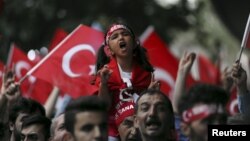The Turkish military has been brought face to face with an old enemy: improvised explosive devices, blamed for nearly half the security personnel deaths that have occurred since early July, when a two-year cease-fire between Ankara and Kurdish separatists broke down.
A dozen IED bombings by the outlawed Kurdistan Workers’ Party (PKK) in the past two months have slain 60 Turkish policemen and soldiers. Sixty-seven have been killed in other armed attacks by Kurdish militants, according to a tally by the state-run Anadolu Agency news service.
Metin Gurcan, a former Turkish military officer and now a commentator, said the PKK’s IED campaign appears to be part of an effort by the separatists to expand the conflict zone by planting the devices in southeastern rural areas, forcing the Turkish military to spread out and easing pressure on PKK militants in larger towns.
“The intensified, hit-and-run IED attacks by the PKK are low-risk and relatively effective and sensational operations that could well help relieve pressure on urban areas,” he wrote in a study for the Al-Monitor news site. “The PKK will likely use IED operations on a frequent basis to hamper armored convoy movements by Turkish security forces, sever connections with towns and bewilder the state authority.”
The PKK’s deadliest IED attack was on September 6 when 16 Turkish security officials were killed in the southeastern Hakkari province. Two days later, as many as 14 were killed in a roadside bombing at Igdır, close to the Turkey-Azerbaijan border. The explosion wrecked a convoy of police vehicles escorting customs officers to the Dilucu border gate.
Hard to counter
The devastating use of IEDs by the PKK is a return to a tactic the group started to use in earnest with deadly effect in 2007.
Faced by superior and better-equipped Turkish forces, the PKK began to avoid direct armed attacks and copied the IED tactic employed by the Lebanese movement Hezbollah against the Israeli Defense Forces in southern Lebanon, and by al-Qaida and other groups in Iraq against U.S. and allied forces in Iraq, claiming hundreds of lives.
In the second half of 2007, the PKK mounted 30 IED attacks.
Countering such a tactic is as difficult now as it was eight years ago, analysts say. The miniaturization of electronics has helped IED makers. Inexpensive and widely available electronics, including cellphones and pagers, serve as simple triggering devices. An IED can be disguised as virtually any object, from piles of trash to cans of food. Explosives can be covered by a dead body or the carcass of a rotting animal.
Fearsome explosives can be packed into a vehicle, as was the case with the Igdır bombing on September 8. Police said in that attack, bombmakers secured a pickup truck, packed it with five tons of explosives, and after parking it by the roadside detonated it remotely when the convoy passed.
The construction of IEDs by the PKK has become a lot more sophisticated since it first started to experiment with rudimentary ones in the 1980s and then began full-scale use of them in 2007. Most PKK IEDs used gas cylinders in the past.
Now, analysts say, the Kurdish bombmakers have available to them more powerful high-explosive charges and chemicals, including fertilizer.
Future attacks
Turkish officials are bracing themselves for many more IED attacks, arguing that Kurdish separatists were preparing for a resumed conflict during the three years of on-and-off peace talks that ended this summer. They claim many IEDs were planted months ago.
They point to the amount of explosives seized in raids during an eight-day curfew in the Cizre district of the southeastern province of Sırnak.
In a news briefing Thursday, the province’s governor, Ali İhsan Su, said 1,150 kilograms of explosives and 39 IEDs were seized. Two roadside bombs were detonated during the curfew.
“The number of PKK militants killed during the period of the curfew is estimated to be around 40,” Su said.
In a note to commercial clients, NYA International, a global risk consultancy, warned that Turkey is now in a grip of a likely spiral of political violence.
“Turkish authorities are likely to intensify counterinsurgency operations targeting PKK strongholds in the southeast, thereby escalating the conflict and increasing the threat of further PKK attacks in the country,” it cautioned.




